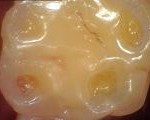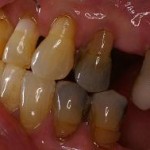Do you ever wake up in the morning and it feels like you’ve just chewed a whole pack of gum? Your facial muscles feel sore and tired or you wake up with a headache, neck/shoulder pain, or ear pain. Or do you look in your mouth and you see where your teeth end and the root begins because the gums have receded? The roots may have notches in them (see below, the yellow is where the roots begin and are notched).
Feel your back teeth with your tongue. Do they feel and look flatter than they used to? Little divots where the points used to be is a sign of wear (see below, the yellow is where the wear is through the enamel)?

When you chew foods or move your jaw up and down, do you hear or feel a click or pop in your jaw joint? Whether your having pain/sensitivity or not, these signs and symptoms are results of we in the dental field call “occlusal disease”. Some call it TMJ, grinding/clenching disease, or just normal life. It basically means that the joint, muscles, and teeth are not in harmony with one another. Those notches, root exposure, and gum recession are signs that the bite is not in balance and there are small areas that are hitting heavier than others causing the teeth to rock in their sockets (think of it as if you were rocking a fence post in the ground, the dirt eventually gets pushed away just like the bone/gums of your teeth). When the parts of the chewing system are not working the way they should, something has to give and the other parts will try to accomodate for the part that isn’t working right.
So I’ve taken a lot of continuing education on this subject of the TMJ and occlusion or bite. And I know that a lot of people live with these symptoms for a long time and they don’t need to. We’ve helped many people get out of pain that has developed from this disease. Many times, if the teeth are to blame, simple procedures such as recontouring the shape of the teeth can eliminate symptoms. In more complex cases, rehabilitating the bite or orthodontics may be necessary. If the joint or muscles are causing the symptoms, a small bite appliance or night guard can help. Regardless, you don’t have to live with the discomfort of these symptoms. Or if I tell you during your exam that there are signs in the mouth of occlusal disease, we can stop the progression so you don’t develop symptoms. This is another reason your cleaning appointment is not just a cleaning, it’s also a examination/diagnosing appointment (but that’s the subject of another post someday).
So if you’re having any of these symptoms or see any of those signs, please give us a call so I can take a look. Trust me, I’ve seen my share of these situations that have gotten worse over short periods and then it becomes more difficult to treat and usually takes more time and financial committment.

